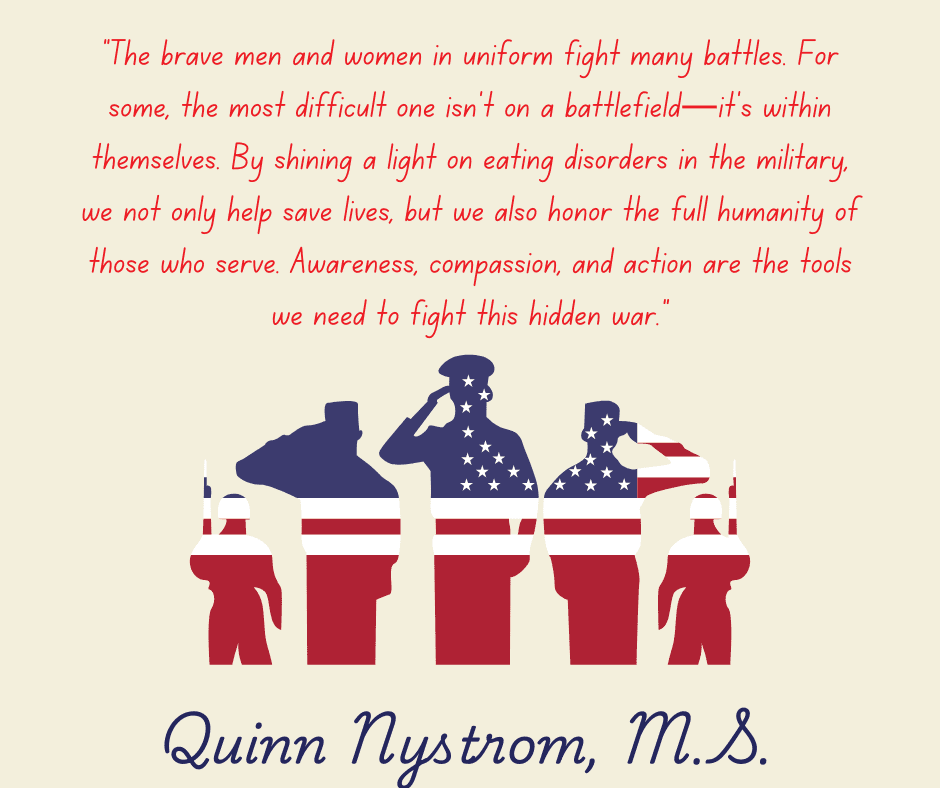Please note that this is an Archived article and may contain content that is out of date. The use of she/her/hers pronouns in some articles is not intended to be exclusionary. Eating disorders can affect people of all genders, ages, races, religions, ethnicities, sexual orientations, body shapes, and weights.

By Quinn Nystrom, MS
When we think of the military, images of discipline, strength, and resilience often come to mind. Service members are trained to push their physical and mental limits, operating under immense pressure to perform and conform to high standards. However, underlying the responsibilities of uniformed service and duty, there exists a frequently unspoken struggle with eating disorders.
The Unseen Enemy
Eating disorders in the military are a rarely discussed but deeply concerning issue. The demand for physical fitness, weight regulations, and the culture of toughness can foster an environment where disordered eating behaviors go unnoticed or are even unintentionally encouraged. For some service members, the pressure to “make weight” can lead to dangerous patterns like bingeing, purging, excessive exercise, and severe restrictions.
Why the Military Is High-Risk
Several factors contribute to a heightened risk of eating disorders among military personnel:
· Strict Weight Standards: Many branches of the military have rigid weight and body composition requirements. The fear of disciplinary action, loss of rank, or discharge can drive unhealthy weight control behaviors.
· Performance Pressure: Elite units and combat roles often demand peak physical condition, which can lead to overtraining and disordered eating habits as a means of achieving or maintaining a particular physique.
· Cultural Norms: A culture that equates toughness with invulnerability can discourage service members from seeking help for mental health struggles, including eating disorders.
· Transition Periods: Times of change, such as returning from deployment or transitioning to civilian life, can exacerbate anxiety, depression, and disordered eating.
Conditions like anorexia, bulimia, and binge eating disorder often thrive in secrecy. In a military culture that values stoicism, admitting to struggling with food or body image may feel like a weakness—or worse, a threat to one’s career. This silence can delay treatment, increase shame, and worsen health outcomes.
My Personal Experience
For my husband, who has proudly served in the U.S. Army Reserve for 17 years, the pressure to meet physical standards never lets up. Despite his dedication and performance, he’s constantly under scrutiny through the Army Body Composition Program (ABCP). Based on his age and weight, he’s expected to fall within a narrow range. If he doesn’t, his waist is taped and his body fat percentage calculated. If it exceeds 24 percent, he’s flagged—put at risk of losing the very career he’s sacrificed so much for.
This is the same man who scored an outstanding 573 out of 600 on the Army Combat Fitness Test—an achievement that speaks volumes about his strength, endurance, and commitment. And yet, despite such exceptional performance, he still gets taped.
In 2023, I watched with pride as he trained for and completed the grueling Norwegian Foot March in Minnesota. Initially developed in 1915, this march tests a soldier’s ability to carry essential gear over long distances under combat-ready conditions. To earn the badge, he had to:
1. March 18.64 miles
2. Carry a rucksack weighing at least 24.25 pounds (dry weight)
3. Wear his full combat uniform and boots
4. Finish within 4 hours and 35 minutes, based on age and gender standards
And he did it. Without complaint. With focus, grit, and heart.
We’ve been together for seven years, and I’ve seen the toll this constant pressure takes—not just on his body, but on his mind. He juggles his military obligations with a full-time civilian job and being a present, loving father and husband. It frustrates me to no end. How can someone capable of completing such elite physical challenges still be penalized for a number on a scale?
To me, this isn’t just about body fat percentage—it’s about a broken system that often overlooks the whole soldier. My husband isn’t just meeting the standard. He’s exceeding it in every way that truly matters.
Breaking the Silence
Addressing eating disorders in the military requires systemic change and increased awareness:
· Normalize Mental Health: Service members need to know that seeking help is a sign of strength, not weakness. Mental health resources should be readily accessible, confidential, and destigmatized.
· Revise Standards: Consideration should be given to revising weight and fitness standards to focus more on functional health and performance, not just numbers on a scale.
· Train Leadership: Commanders and supervisors should be trained to recognize signs of disordered eating and create a supportive environment for those struggling.
· Support Transitioning Veterans: Military to civilian life is a vulnerable time. Ensuring ongoing access to care and community support can make a critical difference.
The brave men and women in uniform fight many battles. For some, the most difficult one isn’t on a battlefield—it’s within themselves. By shining a light on eating disorders in the military, we not only help save lives, but we also honor the full humanity of those who serve. Awareness, compassion, and action are the tools we need to fight this hidden war.
Click here to learn more about how Center for Change works with TRICARE®
















